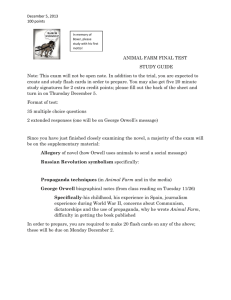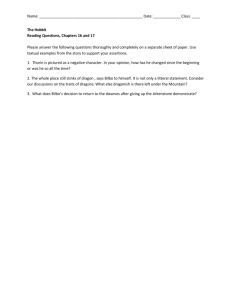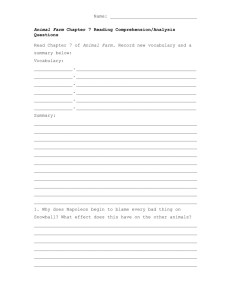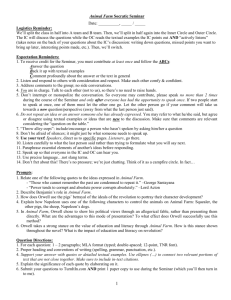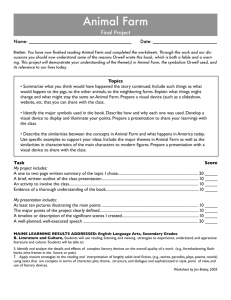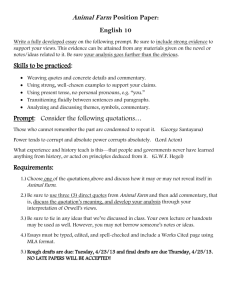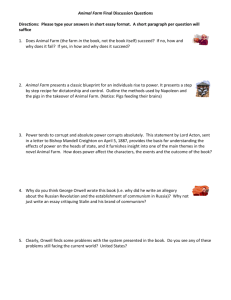read this before you write
advertisement
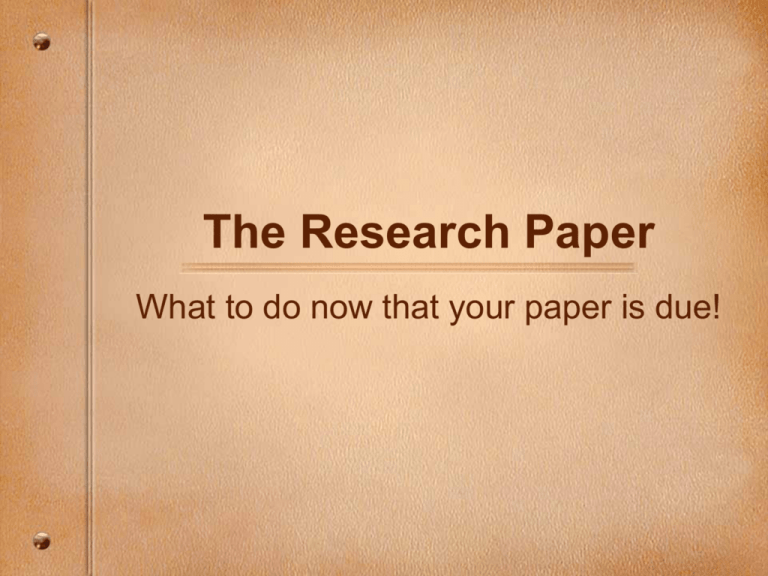
The Research Paper What to do now that your paper is due! NOTE: • Your research paper is NOT NOT NOT a book report. • Your reader (uh, me) has read the book • Do NOT make this a plot summary • If you find yourself telling most of the “story,” you are off track. This is a literary analysis! Where are we going with this? • See next slides for examples of research papers Sample introduction: Use NO quotes in the intro and conclusion. This is the time for YOUR analysis. A World of Good and Evil Throughout history, good and evil have exemplified themselves as the two extremes. Historical figures as Mahatma Gandhi and Martin Luther King Jr. show the good. On the contrary, adversaries such as Adolf Hitler and Saddam Hussein represent evil. Good and evil have clashed through history in wars and battles, leaving wasteland in their path. John Ronald Reuel Tolkien uses this theme as the basis of one of his most world-renowned novels, The Hobbit, the tale of a hobbit named Bilbo Baggins’ quest through middle earth. In The Hobbit, Tolkien describes the characters and events through the recurring motifs of good and evil. (LOOK: Last sentence of intro is thesis!) Body paragraph: Along with Bilbo, Gandalf the wizard represents good in the novel. Gandalf represents good by leading Bilbo and his group of dwarves along their quest, and protecting them from the forces of evil. Gandalf guides Bilbo with advice: “There are no safe paths in this part of the world” (Tolkien 138). Primary source MUST come before a secondary source to put text in context! Gandalf shows his dedication to good and proves his words by battling goblins to save Bilbo and his acquaintances from the forces of evil. Gandalf believes in a good cause: “He is a wise and just being who wanders the realm improving the quality of life” (Gale 100). Good also unveils itself through the Elves who symbolize the keepers of good in middle earth. Elves serve as the wisest of all creatures that habitat middle earth and show their naturally good instincts : “Still elves they were and remain, and that is Good People” (Tolkien 168). One of those many accounts is of their participation in The Battle of Five Armies in which all of good and evil battle for their right to survive. The Battle of Five Armies is described as “… a battle that none had expected; and it was called the Battle of Five Armies, and it was very terrible. Upon one side were the Goblins and the Wild Wolves, and upon the other were Elves and Men and Dwarves” (281). The Battle of Five Armies serves as the main clash between good and evil in The Hobbit and shows how strong forces of evil thoroughly test the good. Another sample intro: A Satirical Society The Russian Revolution, an important historical event, shaped Russia, much like the rebellion of the animals shape George Orwell’s Animal Farm. The actions and motifs (vocab word) of these different animal characters parallel the characteristics of some of the more predominate figures during the Russian Revolution. The animals take control of the farm though the revolution, but soon after, the pigs start to abuse their power and oppress the other animals. This rebellion started by the animals has an uncanny resemblance to the Russian Revolution. Orwell’s writing portrays the suffering of the animals and the power of the pigs to better understand the purpose and the events of the Russian Revolution. In Animal Farm, a wide range of symbolic animals with differing values and beliefs sets up a corrupt society, which serves as a perfect satire of the Russian Revolution and the establishment of Communism. 2nd BODY: Orwell’s use of symbolism continues in his animal characters. Whether the animal stands for a one person or an entire group of people, a strong sense of connection exists between the animal and its historical counterpart. With Old Major, “…grand fatherly philosopher of change— an obvious metaphor for Karl Marx,” this character tells of a dream and a brighter future just as Karl Marx preached a better way of life to his fellow Russians (Netcharles). Two more of Orwell’s symbolic animals take these teachings and carry on Old Major’s dream of a rebellion. Napoleon also parallels a figure involved in the Russian Revolution: “Obviously a metaphor for Stalin, Comrade Napoleon represents the human frailties of any revolution” (Irne 4). Snowball, as the rival to Napoleon, would parallel “…Trotsky, the arch-rival of Stalin in Russia” (16). The other minor characters illustrate important symbolic meaning in their attributes. One such character not considered a major character but still carrying a major part of the plot is Squealer: … critics correlate Squealer with the Pravda, the Russian newspaper of the 1930's. Propaganda was a key to many publications, and … the newspaper was the primary source of media information. So the monopoly of the Pravda was seized by Stalin and his new Bolshevik regime. In Animal Farm, Squealer, like the newspaper, is the link between Napoleon and other animals (White 81). This quote is indented b/c it takes up more than four typed lines. The rich description Orwell uses in paralleling his characters makes Animal Farm a great satirical literary masterpiece. (End paragraphs with YOUR analysis. Do NOT end on a quote!) (Next body paragraph now begins. Notice these are secondary sources. Now, get ready to write! First, what NOT to do: • Graphics, cool binders, and cute titles are no replacement for a well-written paper. The use of huge fonts, wide margins, or extra spacing to pad the page length are immediately obvious. • Write in 12 point Times with ONE INCH margins all around. Go to the fourth page!! (NO credit if not 4 pages) • DO THIS NOW: In the Line Spacing options, “REMOVE space after paragraphs” !!!!! Why do we have to do this? • Based on your own thoughts and the facts and ideas you have gathered from a variety of sources, a research paper is a creation that is uniquely yours. • The experience is one of gathering, interpreting, and documenting information, developing and organizing ideas and conclusions, and communicating them clearly. • Get used to this process! You will exercise it often next year. Avoid long quotes • If your final paper offers six or eight long chunks taken from other sources, stitched together with sentences like, "This quote shows the idea that...", then you are NOT demonstrating the ability to write, only that you can edit quotes together. (I hate the “this shows that” format, by the way.) • Borrow shorter passages, even just a few words; integrate those passages into your own original argument. • You MUST have writing/your analysis between quotes, not just a compilation of quotes. Best secondary quotes offer analysis, NOT plot Non-example from Animal Farm because this is plot only: “Major draws up seven commandments of Animalism to govern the newly named Animal Farm, stipulating that ‘whoever goes on two legs is our enemy’ that ‘all animals are equal’ and that ‘they should not wear clothes, sleep in beds, drink alcohol, or kill any other animal.’” Better example of a secondary quote of analysis, not plot: “Orwell’s love of animals and his practice of raising his own vegetables and animals are clear in his loving description of the farm; his socialist politics come through in his sympathies with the animals as real workers in his description of the barn.” Writing the essay After you have prepared your ideas and written a plan/outline, you are ready to start writing your research paper. Note the absence of the terminology “first draft.” You should turn in what you think is a completed essay. However, I will edit this, and you will have an additional assignment of a rewrite. This writing process leads to a finished, presentable, and hopefully excellent essay. Outline due by deadline! No lates! • You may write the draft in order to meet this deadline • Or • You may outline your intro, body paragraphs with full quotes and lead ins, and conclusion. FOLLOW DIRECTIONS on info sheet in your research packet!! • Either way, this is the only “first draft” option! The idea of my editing early drafts is to help you get the ideas out, to flesh out your answer, and to give you some content to shape and change into a finished essay. YOU are the first editor. Do NOT turn in a draft that you have not corrected yourself. Hint: • Those students who write EARLY, allow me to edit, rewrite, let me re-edit, rewrite, allow me to re-write, etc. earn A+ on their research papers – if they make corrections as I have edited. • If you work early, I will edit as often as you allow me. Look at your calendar for these deadlines. Are these your ideas? • Using someone else's ideas or phrasing and representing those ideas or phrasing as our own, either on purpose or through carelessness, is a serious offense known as plagiarism. “Ideas or phrasing” • Includes written or spoken material, from whole papers and paragraphs to even single sentences and phrases • It also includes statistics, lab results, art work, etc. When to cite a source • You need to cite your source, even if: 1. you put all direct quotes in quotation marks 2. you changed the words used by the author into synonyms 3. you completely paraphrased the ideas to which you referred 4. your sentence is mostly made up of your own thoughts, but contains a reference to the author's ideas 5. you mention the author's name in the sentence From the Uni. of Kentucky: • “Unless the instructor has told you explicitly that you can collaborate on a homework assignment or report, all the work you turn in must be your own. If the work is collaborative, the names of ALL the participants should be on it. • Remember: Paraphrasing is plagiarism!!! • Bottom line: If it isn't your work and/or you aren't sure what to do, footnote it. Ask your instructor BEFORE you turn in the work.” The moral of the story: • When in doubt, give a citation • LEARN from the process we have used with TurnItIn.com • You will use TurnItIn on your final draft Two types of documentation • The Works Cited section will list alphabetically all the sources you've used. • Within the text of your paper, parentheses should show your readers where you found each piece of information that you have used. These textual citations allow the reader to refer to your Works Cited page(s) for further information. Working with quotations • Quotations that constitute up to four TYPED lines in your paper should be set off with quotation marks [ “x” ] and be incorporated within the normal flow of your text. • For quotes that are longer than four typed lines (in your paper), omit the quotation marks and indent the quoted language one inch from your left-hand margin. These inset quotes are NOT doublespaced. Example: One such character not considered a major character but still had a major part of the plot is Squealer: Critics correlate Squealer with the Pravda, the Russian newspaper of the 1930's. The monopoly of the Pravda was seized by Stalin and his new Bolshevik regime. In Animal Farm, Squealer, like the newspaper, is the link between Napoleon and other animals (White 81). What is a quote? • ANYTHING that comes word-for-word from your source, not just words from a character’s mouth. • If quotation marks appear within the text [ “x” ] you must set it as a quote-within-aquote with single-quote marks [ “ ’x’ ” ]. (Spaces added here for emphasis.) Example from Beowulf • “Their leader answered him… ‘We are Geats, Men who follow Higlac’ ” (Citation here!). It’s easy! • Just remember to always start and end quoted material with quotation marks. Any use of quotation marks within the text will be shown through your use of single marks. In the text … • • • … parenthetical references should be kept as brief and as clear as possible Give only the information needed to identify a source. Usually the author's last name and a page reference are all that is needed. Place the parenthetical reference as near as possible to the material being documented, and where a pause would naturally occur, preferably at the end of a sentence. Examples • Author's name in text Shelley expresses this concern (118). • Author's name in reference Once expressing the concern … -- finish the sentence, and then put citation at the end like this (Shelley 118) In parentheses … • If you include an author's name in a sentence, you do not need to repeat it in your parenthetical statement. • Put the ending punctuation mark of the sentence, clause, or phrase that contains the cited material AFTER the parentheses. Example • Jones agrees that Frost’s work affects modern poets, saying, “Robert Frost is regarded as a poet of New England” (213). • Non-example: Jones says, “Robert Frost is regarded as a poet of New England” (213). -- Lead in needs to be more than simply attribution • Electronic and online sources are cited just like print resources. • See sample that follows: Example in text • “Although Alice experiences Wonderland as a child, these events force her to address the world as an adult” (Walker). • Further entries from this source would be cited as only (Walker). What to do now • • • • Write Write Write Know that crises will erupt. Your paper, a complete and finished product, is due printed and in your hands when you walk in the door on the due date. No lates; no extensions. Review the rubric as a guide. No research paper when due = No rewrite • Research paper = 100 points • Rewrite = 300 points

